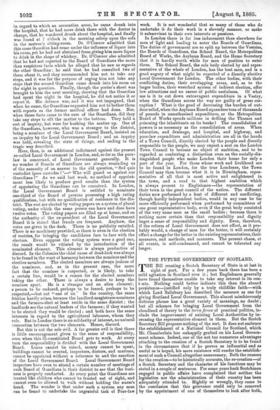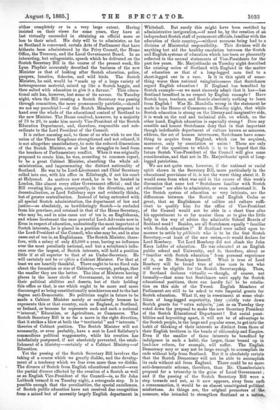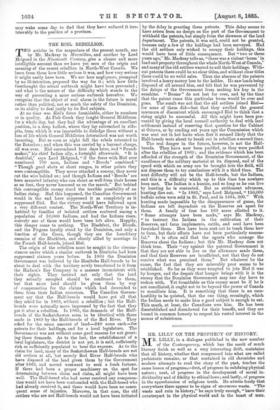THE FUTURE GOVERNMENT OF SCOTLAND. T HE Bill creating a Scotch
Secretary of State is at last in sight of port. For a few years back there has been a mild agitation in Scotland over it ; but Englishmen generally have found themselves unable to take any interest in its coa- t nits. Nothing could better indicate this than the absurd persistence—justified only by a truly childlike faith—with which Lord Salisbury has described the measure as one for giving Scotland Local Government. This almost mischievously dubious phrase has a great variety of meanings, no doubt ; but all schemes for bringing Local Government from the cloudland of theory to the terra firma of practical politics, in- clude the improvement of existing Local Authorities by in- creasing the representative element in them. But the Scotch Secretary Bill proposes nothing of the sort. It does not embrace the establishment of a National Council for Scotland, which Mr. Chamberlain has unhappily grafted on his Local Govern- ment scheme. Indeed, one of the not too numerous advantages attaching to the creation of a Scotch Secretary is to be found in the circumstance that if he proves as influential and as useful as is hoped, his mere existence will render the establish- ment of such a Council altogether unnecessary. Both the reasons for the creation—to be historically accurate, the re-creation—of a Scotch Secretary and the character of his functions may be stated in a couple of sentences. For some years back Scotchmen engaged in public affairs have complained that neither the legislation nor the administration of their country has been adequately attended to. Rightly or wrongly, they came to the conclusion that this grievance could only be removed by the appointment of one of themselves to look after both, either completely or to a very large extent. Having insisted on their views for some years, they have at last virtually succeeded in obtaining an official more or less to their mind. His duty will be to administer, so far as Scotland is concerned, certain Acts of Parliament that have hitherto been administered by the Privy Council, the Home Office, the Treasury, and the Local Government Board. In an interesting, but antagonistic, speech which he delivered on the Scotch Secretary Bill in the course of the present week, Sir Lyon Playfair accurately described the business of the new Minister as that of looking after Scotch education, police, paupers, lunatics, fisheries, and wild birds. The Scotch Minister, he said, would be "made up of a large variety of heterogeneous material, mixed up like a Scotch haggis, and then salted with education to give it a flavour." This educa- tional salt has, however, lost some of its savour. On Tuesday night, when the Bill creating a Scotch Secretary was passing through committee, the more pronouncedly patriotic,—should we not say parochial I—of the Scotch Members proposed to hand over the whole of the educational control of Scotland to the new Minister. The House resolved, however, by a majority of 73 to 26, to make him merely Vice-President of the Scotch Education Department, and, therefore, responsible and sub- ordinate to the Lord President of the Council.
It is rather amusing and, to those of us who wish to see the union of the Three Kingdoms strengthened and not relaxed, it is not altogether unsatisfactory, to note the reduced dimensions of the Scotch Minister, as at last he struggles to land from the breakers of Parliamentary conflict. When it was originally proposed to create him, he was, according to common report, to be a great Cabinet Minister, absorbing the whole ad- ministration, and impersonating the distinct nationality of Scotland. He was to be Lord-Lieutenant and Chief Secretary rolled into one, with his office in Edinburgh, if not his court at Holyrood. As matters now stand, he is to be located in London, like almost every other Government official ; and the Bill creating him goes, consequently, in the direction, not of decentralisation, as Lord Salisbury says and evidently thinks, but of greater centralisation. Instead of being entrusted with all special Scotch administration, the department of law and justice—so absolutely, so bewilderingly Scotch—is excluded from his province, and retained in that of the Home Secretary, who may be, and in nine cases out of ten is, an Englishman, and whose lieutenant the once powerful Lord-Advocate now is. Even in respect of education, undoubtedly the most important of Scotch interests, he is placed in a position of subordination to the Lord-President of the Council, who also may be, and in nine cases out of ten is, an Englishman. The Scotch Minister, there- fore, with a salary of only £2,000 a year, having no influence over the most peculiarly national, and but a subaltern's influ- ence over the largest, of Scotch interests, will hold a position little if at all superior to that of an Under-Secretary. He will certainly not be ex officio a Cabinet Minister. For that at least we are heartily thankful. There ought to be no fixed rule about the formation or size of Cabinets,—except, perhaps, that the smaller they are the better. The idea of Ministers having places in the inner circle of Government, in virtue not of their political abilities and deserts, but of their holding this office or that, is one which ought to be more and more discouraged as being constitutionally mischievous and to the last degree anti-Democratic. No politician ought in future to be made a Cabinet Minister merely or exclusively because he represents this or that country, such as England, or Scotland, or Ireland, or because he represents such and such a national "interest," Education, or Agriculture, or Commerce. The Scotch Secretary Bill is so far a move in the right direction, that it strikes a blow at both the " territorial " and "interests " theories of Cabinet position. The Scotch Minister will not necessarily, or even probably, have a seat in Lord Salisbury's commodious political waggonnette, while his creation has indefinitely postponed, if not absolutely prevented, the estab- lishment of a Ministry—certainly of a Cabinet Ministry—of Education.
Yet the passing of the Scotch Secretary Bill involves the taking of a course which we greatly dislike, and the develop- ment of a tendency which we fear even more than we dislike. The divorce of Scotch from English educational control—even the partial divorce effected by the creation of a Scotch as well as an English Vice-President of the Council—is, as Sir John Lubbock termed it on Tuesday night, a retrograde step. It is possible enough that the peculiarities, the special excellences, of Scotch public education have not received due recognition from a mixed but of necessity largely English department in Whitehall. But surely this might have been rectified by administrative invigoration,—if need be, by the creation of an independent Scotch staff of permanent officials, familiar with the education of their country,—without recourse being had to a division of Ministerial responsibility. This division will do anything but aid the healthy emulation between the Scotch and English systems of education which has been so pleasantly reflected in the annual statements of Vice-Presidents for the past few years. Mr. Marjoribanks on Tuesday night described the existing union of Scotland with England in the matter of education as that of a long-legged man tied to a short-legged one in a race. Is it in this spirit of some- thing worse than national vaingloriousness that Scotchmen regard English education ? If England has benefited by Scotch example—as we most sincerely admit that it has—has Scotland benefited in no respect by English example? Have Scotch boys, teachers, and Boards absolutely nothing to learn from English Was Mr. Mundella wrong in the statement he made in the House of Commons on Monday night, that while Scotch education is strong on the literary and imaginative side, it is weak on the real and technical side, on which, on the other hand, English education is especially strong? Does any sensible and honest Scotchman deny that in that important though indefinable department of culture known as manners, address, the art of human intercourse, Scotchmen have some- thing to acquire from England, which can be acquired, moreover, only by association or union ? These are only some of the questions to which it is to be hoped that the future Scotch Vice-President of the Council will give some consideration, and that not in Mr. Marjoribanks' spirit of long- legged patriotism.
We are not quite sure, however, if the national or racial spirit shown in the Secretary Bill, more particularly in the educational provisions of it, is not the worst thing about it. It would seem from what was said in the course of this week's discussion that none but " Scotchmen familiar with Scotch education" are able to administer, or even understand it. Is the Scotch system of education BO very intricate, are the differences between the Scotch and English Codes so great, that an Englishman of calibre and culture suffi- cient to qualify him for the office of Vice-President of the Council would not be able in a short time after his appointment to so far master them as to give the little help in the way of advice the admirable School Boards of Scotland need Besides, are all Scotchmen equally "familiar with Scotch education I" If Scotland were called upon to- morrow to settle by plibiscite who is to be the first Scotch Secretary,—at least of the new series,—it would declare for Lord Rosebery. Yet Lord Rosebery did not climb the John Knox ladder of education. He was educated at an English public school and University, and is, therefore, about as "familiar with Scotch education" from personal experience of it, as Mr. Stanhope himself. What is true of Lord Rosebery will be found true of nine men in ten who will ever be eligible for the Scotch Secretaryship. Then, if Scotland declares virtually — though, of course, not formally—that none but Scotchmen need apply for Scotch educational positions, there can hardly fail to be retalia- tion on this side of the Tweed. English Members of Parliament are still to be asked to vote Imperial grants for Scotch education. What if, say in resentment at some ebul- lition of long-legged superiority, they quietly vote down. Scotch grants for "extra subjects," just as on Tuesday they voted down the proposal to make the new Secretary President of the Scotch Educational Department ? But social possi- bilities and boycotting apart, it will not be of advantage to- the Scotch people, in the large and popular sense, to get into the habit of thinking of their interests as distinct from those of their English brethren in the bonds of citizenship and Empire. Even if the smaller of these interests be benefited by indulgence in such a habit, the larger, those- bound up in land-law reform, for example, will suffer. The English Democracy may or may not be large enough to accomplish its ends without help from Scotland. But it is absolutely certain that the Scotch Democracy will not be able to accomplish its ends without aid from England. There could be no more anti-democratic scheme, therefore, than Mr. Chamberlain's proposal for a tetrarchy in the guise of Local Government ; and if the passing of the Scotch Secretary Bill were a step towards and not, as it now appears, away from such a consummation, it would be an almost unmitigated political misfortune. As things are, the original promoters of the measure, who intended to strengthen Scotland as a nation,
may wake some day to find that they have reduced it irre- trievably to the position of a province.




































 Previous page
Previous page